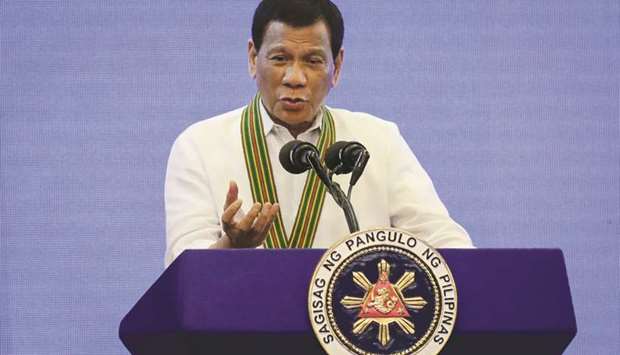His domestic reputation has survived a brutal drug war that took thousands of lives, a personal attack on religion, jokes about rape and a barrage of misogynistic comments about women.
But now the Filipino president, Rodrigo Duterte, is facing the first serious dip in his popularity ratings at a time of soaring inflation, which has seen the price of everyday basics such as rice, bread and fuel as much as double.
Duterte’s targeted attacks on his vocal critics also received their first pushback from the courts this week, after a judge rejected the petition for the arrest of Sen Antonio Trillanes IV, who has been one of the president’s fiercest opponents during his two years in power. The move was described as a “huge political slap” to the president.
Inflation in the Philippines, which was one of the fastest growing economies in south-east Asia, is now at almost 7%, a nine-year record for the country and the highest in the region.
“Duterte has had dents in his popularity in the past, but in the past few months this has been the most sustained decline in his popularity,” said Maria Ela L Atienza, editor of the Philippine Political Science Journal.
“The price of groceries is increasing, transportation is getting more expensive and in disarray, and the price of even basic foods like bread is increasing.
A lot of people are angry and they are complaining because they are really feeling the effect of the rising cost of living.”
Since he was elected in 2016, Duterte’s popularity rating has consistently remained at about 80% due to his appeal to the biggest sections of voters — poor people in urban areas and the middle classes — many of whom praise his brash, often offensive style, which was seen as an antidote to “corrupt, imperial Manila”.
But his popularity has taken a hit and is now by some estimates between 50% and 60%, mainly because of a new tax policy, which was aimed at lowering national poverty to 14% but increased the price of everyday goods with a value-added tax.
It meant the overall cost of food had risen by 10% in September, with the price of fish rising by 12% and vegetables by 20%. People in the Philippines even reported loaves of bread being smaller.
In the southern region of Zamboanga, a state of calamity was declared after a shortage of rice, and prices rose by a reported 75%. The national shortage got so bad that the government lifted restrictions on rice imports to try to relieve demand and bring prices down, but many say it has come too late and does not solve the long-term problem. The rising price of fuel has also hit poor people in urban areas hard, and things will worsen when public transport prices go up a planned two pesos (3p) in November.
In the main, Duterte has refused to acknowledge his administration’s role in the crisis, blaming “corrupt” rice hoarders, the US-China trade war and then rising global oil prices for the increase in the cost of living.
Certainly Typhoon Mangkhut, which hit one of the most agricultural areas of the Philippines and destroyed more than 250,000 tonnes of rice, did not help matters, but critics have accused the government of not adequately stockpiling.
However Atienza said that the decline in Duterte’s popularity was also linked to the fact that he had now been in power for more than two years, and major promises had not been fulfilled.” Duterte made the promise he would eliminate drugs in six months or one year but still no major drug dealers have been caught and a lot of people, including children, have died,” she said.
“Most of the promised infrastructure projects programme have not been fulfilled.
A lot of people in the metro Manila area have a lot of problems with the mass transport system, and the conditions of the trains are very bad — and he has not eliminated the security problems with militants and communist insurgents in the south.”

Rodrigo Duterte’s popularity has fallen from about 80% to between 50-60%.
